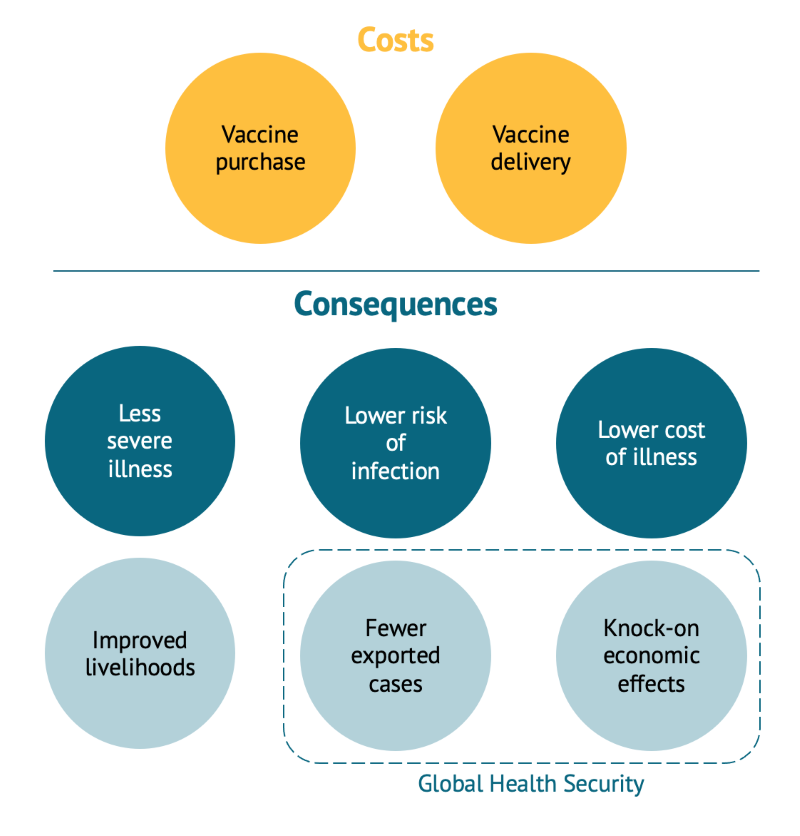Recommended

Blog Post
In times of plenty, anyone can afford to be generous. True generosity is revealed in times of scarcity. Without context phrases like “common purpose,” “shared values,” and “global village” easily become empty platitudes. So it seems with the global response to COVID-19. As the virus spread and shut down life as we know it, global response became increasingly tainted by provincialism. From seizing masks and medical supplies en route to other countries to preventing vaccine exports, the world’s richest countries turned inward and neglected the global response effort. As recently as December 2020, COVAX—the global program to get vaccines to the world’s poorest—was “struggling from a lack of funds, supply risks, and complex contractual arrangements which could make it impossible to achieve its goals.” While those conditions have improved recently, those improvements are largely tied to changes in politics rather than changes in the nature of the problem. Beyond the rank hypocrisy of countries whose foreign policy is “values-based,” there is the weakness of the underlying logic. Even for countries wishing to be self-interested and focus on their protecting their population, vaccinating only their residents, and allowing the virus to spread unchecked everywhere else carry the very real risk of undoing their vaccination effort with the emergence of more potent variants.
There was nothing preventing those with initial access to vaccines from deciding that the first phase of vaccination would be for all healthcare workers everywhere in the world. Over the past year, we have seen harrowing stories of burnout from doctors and nurses in the West. It should not take much imagination to picture what it is like in places with even fewer health care workers per 1000 people. The scale of the burden they faced before COVID-19 was already overwhelming. Protecting the global health workforce would have been a logical and equitable first step of any response to a global pandemic.
We could have then moved on to the elderly everywhere, and people in parts of the world where it is impossible to work from home, social distance, or easily adhere to other public health measures. There are multiple equitable iterations of vaccine access that would have made more sense in the long-run and for the long-term eradication of the disease. Senegal, for example, donated ten percent of its meager COVID-19 vaccines to neighbors Guinea Bissau and the Gambia.
Over the course of this pandemic, world leaders have described their countries as being on a war footing, justifying extraordinary interventions with implications for the economy and civil liberties. The pandemic is such a rare and destabilizing event during, uncoordinated response, national or international, is inadequate and borderline reckless. It reminds me of a time a little over a decade ago when the US attempted to rally its citizens and the world against what it called a “global threat.” In a bid to shore up waning support for an increasingly unpopular, and frankly unnecessary, war, President Bush gave a number of addresses around the country between 2000 and 2008, including one at the 89th Annual Convention of the American Legion in Reno, Nevada. I want to return to that speech because as misguided as the enterprise was, it was the appropriate attitude to adopt against a real global threat—like this pandemic.
He spoke of using all elements of American power to protect the American people and most importantly “taking the fight to the enemy.” He described the campaign as “keeping the pressure on them…forcing them to move…disrupt[ing] their networks. He told Americans that US diplomats were rallying friends and allies to “rout extremists hiding in their midst.” Most importantly, he noted that the US was fighting “them over there, so [it would] not have to face them in the United States of America.” This last line was the applause line and got the desired response.
If a US President could sell an unnecessary war on patently spurious claims, it should be possible for leaders to make the case for solidarity in the pandemic response. In the US, for example, there were moments in the worst months of the outbreaks when daily deaths in the US exceeded the toll of 9/11 in an ongoing outbreak. No terrorist or extremist has cost any country as much in life and livelihood or posed so great a threat to the global economy.
But there are aspects of President Bush’s over-the-top response to a non-existent threat to the United States that Western leaders could have adapted in this fight against a global threat to us all:
-
Keep the pressure on it and disrupt its network, rally friends and allies to rout the enemy in their midst: Slowing the spread of the virus and breaking transmission chains would disrupt its network. This was necessary everywhere. It had to be a multinational effort. President’s Trump decision to initiate withdrawal from the World Health Organization in the middle of the pandemic was probably one of the worst responses to a pandemic ever, even purely through the lens of self-interest.
-
Take the fight to the enemy, fight them over there so we do not have to fight them over here: The South African, British, and Brazilian variants of the virus eventually spread across the world—potentially threatening the success of the vaccination effort. Preliminary research indicates that the Brazilian variant was “able to evade 25-61 per cent of protective immunity elicited by previous infection” with any earlier variant…a sign that current vaccines could also be less effective against it.” Western officials could have made the case to their population that their long-term security and freedom from this disease is tied to defeating it everywhere.
It is not too late to correct what has been an egregious failure in leadership. There is still time to do the right thing. This is a war, if not in the conventional sense then in terms of the daily health and economic damage from COVID-19. The first and most obvious step would be copying Senegal’s example and making a percentage of all available vaccine supplies available to lower-income countries, either directly through bilateral transfers or through COVAX. COVAX’s aim of vaccinating 20 percent of the population of its beneficiary countries is laudable, but grossly inadequate. Financing COVAX to acquire and supply enough vaccines to inoculate another 45 percent of the population of COVAX countries is both the moral and self-interested thing to do.
Disclaimer
CGD blog posts reflect the views of the authors, drawing on prior research and experience in their areas of expertise. CGD is a nonpartisan, independent organization and does not take institutional positions.






